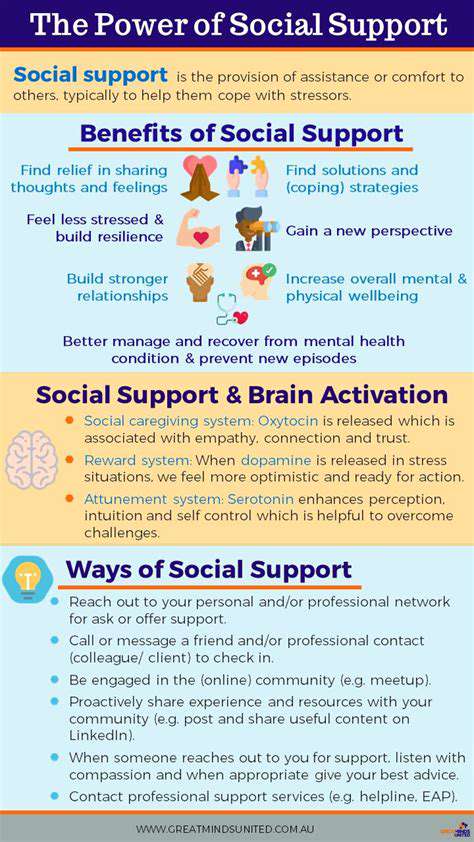Finding Your Tribe: The Importance of Social Support

The Foundation of Connection
From the moment we're born, we crave connection like plants crave sunlight. Our brains are wired for social interaction, with neural pathways that light up when we engage with others. This biological imperative explains why solitary confinement is considered one of the harshest punishments - it goes against our fundamental nature.
Research shows that people with strong social ties live longer, recover from illness faster, and report higher life satisfaction. These findings aren't just statistics; they reflect the deep psychological nourishment we derive from meaningful relationships. When we feel connected, our bodies literally function better, with lower stress hormones and stronger immune responses.
The Role of Shared Experiences
Think about the last time you laughed until your sides hurt with friends, or worked together to solve a difficult problem. These moments create invisible threads that bind people together, forming what psychologists call emotional resonance. It's not just about being in the same place at the same time, but about the mutual understanding that grows from these interactions.
Military veterans often describe their unit as family because shared challenges create bonds that transcend ordinary friendship. This phenomenon isn't limited to extreme situations - book clubs, sports teams, and volunteer groups all tap into this powerful human dynamic. The secret lies in the combination of shared purpose and emotional vulnerability.
Navigating the Complexities of Exclusion
Remember that sinking feeling when you walked into a room where everyone seemed to know each other except you? That visceral reaction stems from ancient survival mechanisms - our ancestors depended on group acceptance for protection and resources. Today, while the stakes are lower, the pain of exclusion remains just as real.
Neuroscience reveals that social rejection activates the same brain regions as physical pain. This explains why workplace bullying or social media exclusion can feel like literal wounds. The silver lining? Understanding this biological basis helps us develop better strategies for creating inclusive environments where everyone can thrive.
Cultivating a Culture of Belonging
Creating true belonging isn't about forced smiles or mandatory team-building exercises. It starts with small, genuine gestures - remembering someone's coffee order, acknowledging their contributions, or simply making eye contact when they speak. These micro-moments of connection accumulate into a powerful sense of community.
The most effective leaders understand that belonging isn't a perk - it's the foundation of any successful group. Companies with strong cultures of inclusion see lower turnover, higher creativity, and better problem-solving. Schools that prioritize belonging report improved academic performance and student well-being. The evidence is clear: when people feel valued for who they are, they bring their best selves to every endeavor.
Beyond Casual Acquaintances: Recognizing Your True Tribe

Expanding Social Circles: Cultivating Meaningful Connections
In our hyper-connected digital age, we've paradoxically become masters of shallow interaction. True connection requires moving beyond likes and emojis to the messy, beautiful realm of authentic human interaction. It means having conversations where we risk being misunderstood, share unpopular opinions, and reveal our imperfect selves.
The people who truly matter aren't necessarily those we see most often, but those who make us feel most alive. They're the ones who ask thoughtful questions, remember our stories, and challenge us to grow. Building these relationships takes courage - it means being the first to reach out, to share something personal, to sit with someone else's pain without rushing to fix it.
Navigating Social Dynamics: Strategies for Connection
Social skills aren't innate talents - they're muscles we can develop with practice. Start by becoming a social detective, observing how people light up when discussing certain topics. Notice when someone's body language says I need space versus I'd love to talk more. These subtle cues are the secret language of human connection.
The most magnetic people aren't those who talk the most, but those who make others feel heard. They practice what psychologists call active listening - reflecting back what they've heard, asking follow-up questions, and resisting the urge to immediately share their own stories. This simple shift can transform superficial chats into meaningful exchanges.
Conflict, when handled well, can actually deepen relationships. The key is approaching disagreements with curiosity rather than defensiveness. Try phrases like Help me understand your perspective instead of Here's why you're wrong. This creates space for mutual understanding rather than escalating tension.
Shared values create stronger bonds than shared interests. While loving the same band might spark a friendship, aligning on fundamental beliefs about kindness, integrity, or growth sustains it through life's ups and downs. Pay attention to how people treat waitstaff, talk about their exes, or respond to good fortune - these moments reveal character.
Navigating Challenges and Building Your Tribe

Navigating Complex Situations
Great leaders understand that challenges are opportunities in disguise. When facing a difficult situation, they ask: What can we learn from this? rather than Whose fault is this? This subtle reframe transforms problems into collective puzzles to solve rather than battles to win.
The most effective problem-solvers don't just look at the immediate issue, but examine the systems and patterns behind it. They know that addressing surface symptoms brings temporary relief, while understanding root causes creates lasting change. This systems-thinking approach prevents recurring problems and builds team confidence.
Building Trust and Rapport
Trust isn't built in grand gestures, but in small, consistent actions over time. It's about showing up when you say you will, admitting when you don't know something, and giving credit where it's due. People will forget what you said, but they'll remember how you made them feel. This emotional residue determines whether relationships flourish or fade.
Vulnerability acts as a trust accelerator. When leaders appropriately share their own struggles and uncertainties, it gives others permission to do the same. This creates psychological safety - the foundation of high-performing teams where people feel comfortable taking risks and admitting mistakes.
Developing Effective Communication Strategies
Clear communication begins with understanding your audience. Technical experts might need data, while creative types respond better to stories. The magic happens when you can translate complex ideas into language that resonates with each listener. Great communicators don't just transmit information - they create understanding.
The most overlooked communication skill? Knowing when to stop talking. Strategic silence gives people space to process information and formulate thoughtful responses. It's in these pauses that real understanding often emerges, making conversations more productive and meaningful.
Delegating Responsibly and Empowering Teams
Effective delegation isn't about dumping unwanted tasks - it's about matching people with opportunities that stretch their abilities while providing appropriate support. Think of it as professional matchmaking: pairing team members' growing edges with challenges that help them develop.
Empowerment without guidance is abandonment, while control without autonomy is micromanagement. The sweet spot lies in providing clear expectations, necessary resources, and regular check-ins while giving people freedom in how they achieve results. This balance fosters both accountability and creativity.
Read more about Finding Your Tribe: The Importance of Social Support
Hot Recommendations
- AI Driven Personalized Sleep Training for Chronic Insomnia
- AI Driven Personalization for Sustainable Stress Management
- Your Personalized Guide to Overcoming Limiting Beliefs
- Understanding Gender Dysphoria and Mental Health Support
- The Power of Advocacy: Mental Health Initiatives Reshaping Society
- Building a Personalized Self Compassion Practice for Self Worth
- The Ethics of AI in Mental Wellness: What You Need to Know
- AI Driven Insights into Your Unique Stress Triggers for Personalized Management
- Beyond Awareness: Actionable Mental Health Initiatives for Lasting Impact
- Creating a Personalized Sleep Hygiene Plan for Shift Workers
